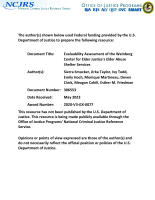Propensity Scoring
The Crime Prevention Effect of CCTV in Public Places a Propensity Score Analysis
Infusing Evidence into Police Reform: Field Initiated Action Research with the Louisville Metro Police Department
Restrictive housing for prison rule violators: Specific deterrence or defiance?
How to Free a Butterfly: The Impact of Fair Chance Housing Ordinances on the Housing Outcome of System-Impacted Black Individuals
Does GPS Supervision of Intimate Partner Violence Defendants Reduce Pretrial Misconduct? Evidence From a Quasi-experimental Study
Circumventing the Sentencing Grid: Encouraging Downward Departures in Presumptive Prison Cases
NIJ Multisite Impact and Cost-Efficiency Evaluation of Veterans Treatment Courts
A Multisite Evaluation of Prosecutor-Led Pretrial Diversion: Effects on Conviction, Incarceration, and Recidivism
Evaluability Assessment of the Weinberg Center for Elder Justice's Elder Abuse Shelter Services
Phased Evaluation of an OVC-Funded National Resource Center: Assessing VictimConnect’s Implementation and Outcomes for the Victim Service Field
NIJ Multisite Impact and Cost-Efficiency Evaluation of Veterans Treatment Courts
Revisiting and Unpacking the Mental Illness and Solitary Confinement Relationship
The Impact of Ambiguity-induced Error in Offender Decision-making: Evidence from the Field
Evaluating Impacts of the Philadelphia Police School Diversion Program: An Alternative to Arrest Policing Strategy
School Safety and School-Based Mental Health Services in a Large Metropolitan School District
Diverse Long-Term Effects of Childhood Exposure to Intimate Partner Violence: Development of Externalizing Behaviors in Males and Females
Assessing the gang level and community level effects of the Philadelphia Focused Deterrence strategy
A Process and Impact Evaluation of Illinois' Policy to Eliminate Cash Bail and Reform Pretrial Practices
How do close-circuit television cameras impact crimes and clearances? An evaluation of the Milwaukee police department's public surveillance system
Addressing Student Mental Health Concerns - Breakout Session, NIJ Virtual Conference on School Safety
On February 16-18, 2021, the National Institute of Justice hosted the Virtual Conference on School Safety: Bridging Research to Practice to Safeguard Our Schools. This video includes the following presentations:
See the YouTube Terms of Service and Google Privacy Policy




